Target Lock
James H. Cobb
Reviewers hailed James H. Cobb's previous Amanda Lee Garrett novels as "breathtaking" and "lightning-paced" (Publishers Weekly), and "hot as a Sea SLAM missile with target lock" (Library Journal). Murder Ink called Garrett "the best naval hero since Tom Clancy's Jack Ryan."
In Target Lock, an industrial research satellite falls to the Indonesian sea after a series of successful tests-only to disappear along with its international recovery team and their ship. NATO and U.S. military officials believe that it has been stolen, but by whom and why? Commander Garrett and her U.S. Navy task force are called in for the hunt, this time among some of the most beautiful, but uncharted, islands on earth, the Indonesian archipelago. Garrett soon suspects that a high-tech pirate has plans for the satellite and its data, but the man she meets is more than her match. He has amassed a sea force of his own and built a hidden fortress undetectable to all but the most sensitive intelligence-gathering equipment. When Garrett herself is kidnapped, her crew, aboard the destroyer U.S.S. Cunningham with its array of modern weaponry, charges in to her defense.
Cobb has crafted another heart-stopping tale, featuring one of the most original characters in military fiction and the technology and strategy the U.S. Navy will almost certainly one day employ.
0399148493
The Alchemist
Paulo Coelho
Like the one-time bestseller Jonathan Livingston Seagull, The Alchemist presents a simple fable, based on simple truths and places it in a highly unique situation. And though we may sniff a bestselling formula, it is certainly not a new one: even the ancient tribal storytellers knew that this is the most successful method of entertaining an audience while slipping in a lesson or two. Brazilian storyteller Paulo Coehlo introduces Santiago, an Andalusian shepherd boy who one night dreams of a distant treasure in the Egyptian pyramids. And so he's off: leaving Spain to literally follow his dream.
Along the way he meets many spiritual messengers, who come in unassuming forms such as a camel driver and a well-read Englishman. In one of the Englishman's books, Santiago first learns about the alchemists—men who believed that if a metal were heated for many years, it would free itself of all its individual properties, and what was left would be the "Soul of the World." Of course he does eventually meet an alchemist, and the ensuing student-teacher relationship clarifies much of the boy's misguided agenda, while also emboldening him to stay true to his dreams. "My heart is afraid that it will have to suffer," the boy confides to the alchemist one night as they look up at a moonless night.
"Tell your heart that the fear of suffering is worse than the suffering itself," the alchemist replies. "And that no heart has ever suffered when it goes in search of its dreams, because every second of the search is a second's encounter with God and with eternity." —Gail Hudson
0062502174
First, Break All the Rules: What the World's Greatest Managers Do Differently
Curt Coffman
Marcus Buckingham and Curt Coffman expose the fallacies of standard management thinking in First, Break All the Rules: What the World's Greatest Managers Do Differently. In seven chapters, the two consultants for the Gallup Organization debunk some dearly held notions about management, such as "treat people as you like to be treated"; "people are capable of almost anything"; and "a manager's role is diminishing in today's economy." "Great managers are revolutionaries," the authors write. "This book will take you inside the minds of these managers to explain why they have toppled conventional wisdom and reveal the new truths they have forged in its place."
The authors have culled their observations from more than 80,000 interviews conducted by Gallup during the past 25 years. Quoting leaders such as basketball coach Phil Jackson, Buckingham and Coffman outline "four keys" to becoming an excellent manager: Finding the right fit for employees, focusing on strengths of employees, defining the right results, and selecting staff for talent—not just knowledge and skills. First, Break All the Rules offers specific techniques for helping people perform better on the job. For instance, the authors show ways to structure a trial period for a new worker and how to create a pay plan that rewards people for their expertise instead of how fast they climb the company ladder. "The point is to focus people toward performance," they write. "The manager is, and should be, totally responsible for this." Written in plain English and well organized, this book tells you exactly how to improve as a supervisor. —Dan Ring
0671582488
Built to Last: Successful Habits of Visionary Companies
James C. Collins, Jerry I. Porras
This analysis of what makes great companies great has been hailed everywhere as an instant classic and one of the best business titles since In Search of Excellence. The authors, James C. Collins and Jerry I. Porras, spent six years in research, and they freely admit that their own preconceptions about business success were devastated by their actual findings—along with the preconceptions of virtually everyone else.
Built to Last identifies 18 "visionary" companies and sets out to determine what's special about them. To get on the list, a company had to be world famous, have a stellar brand image, and be at least 50 years old. We're talking about companies that even a layperson knows to be, well, different: the Disneys, the Wal-Marts, the Mercks.
Whatever the key to the success of these companies, the key to the success of this book is that the authors don't waste time comparing them to business failures. Instead, they use a control group of "successful-but-second-rank" companies to highlight what's special about their 18 "visionary" picks. Thus Disney is compared to Columbia Pictures, Ford to GM, Hewlett Packard to Texas Instruments, and so on.
The core myth, according to the authors, is that visionary companies must start with a great product and be pushed into the future by charismatic leaders. There are examples of that pattern, they admit: Johnson & Johnson, for one. But there are also just too many counterexamples—in fact, the majority of the "visionary" companies, including giants like 3M, Sony, and TI, don't fit the model. They were characterized by total lack of an initial business plan or key idea and by remarkably self-effacing leaders. Collins and Porras are much more impressed with something else they shared: an almost cult-like devotion to a "core ideology" or identity, and active indoctrination of employees into "ideologically commitment" to the company.
The comparison with the business "B"-team does tend to raise a significant methodological problem: which companies are to be counted as "visionary" in the first place? There's an air of circularity here, as if you achieve "visionary" status by ... achieving visionary status. So many roads lead to Rome that the book is less practical than it might appear. But that's exactly the point of an eloquent chapter on 3M. This wildly successful company had no master plan, little structure, and no prima donnas. Instead it had an atmosphere in which bright people were both keen to see the company succeed and unafraid to "try a lot of stuff and keep what works." —Richard Farr
0887307396
America: A Jake Grafton Novel
Stephen Coonts
Rear Admiral Jake Grafton, who has appeared in eight previous Coonts novels (most recently Cuba and Hong Kong), returns for another techno-thriller from one of the genre's top practitioners. The first couple of pages recount the disappearance of SuperAegis, a satellite that's the cornerstone of a new American-European-Russian antimissile defense system, on its first, much heralded trial. But Jake Grafton is only on that case for a few paragraphs before the stealth submarine U.S.S. America is hijacked on her maiden voyage. The sub quickly lives up to her reputation as the sneakiest undersea vessel in the world by seeming to vanish into the Atlantic. It takes a little while for Grafton to connect the dots between the two military blunders, by which time missiles fired from the America have devastated Washington, frying every electronic circuit in the city, and even burning the White House to the ground. Between looking for the rogue sub, searching for the satellite, and trying to get some answers about the team the CIA trained to steal a Russian sub (and then beached when the mission was canceled), Grafton's got his hands full.
Stephen Coonts describes the submarine at the center of the action so lavishly and lovingly that the U.S.S. America is much more real—and even more human—than any of his flesh-and-blood characters, including Grafton himself. The mysterious German financier who's at the bottom of it all doesn't get more than a walk-on; he's a cardboard villain, just like the brilliant female computer expert who sets up his crimes. But none of that matters if you like this kind of tale, which combines excitement and action with loads of information about computers, sonar, weapons systems, and stealth technology. America will surface quickly and take a commanding position on the summer bestseller lists. —Jane Adams
0312253419
Combat
Stephen Coonts
Will the next war be fought in cyberspace? Stephen Coonts, author of the watershed military novel, Flight of the Intruder, offers this collection of 11 21st-century novellas for fans of contemporary and near-future military fiction. Technology is the binding element of Combat, and fans of Tom Clancy's high-tech military espionage thrillers will find much to love, from ultra-smart weapons to the technical infrastructure of the armed forces of the future. Don't expect hard core science fiction; the villains are of the more realistic variety: terrorists, rogue governments, and outlaw technology. Some of these stories are encumbered with a level of detail only the serious enthusiast will enjoy. (Dale Brown's "Leadership Material" has whole passages describing regs and paperwork that will bore all but the most ardent fans of the genre.) Highlights include Harold W. Coyle's fast-paced "Cyberknights," the most likely candidate from this collection to become a big-budget feature film. —Brendan LaSalle
0312871902
Cuba
Stephen Coonts
When a North Korean freighter carrying a cargo of biological weapons runs aground in international waters off Cuba—Rear Admiral Jake Grafton wants go aboard, taking just one other man with him. His new chief of staff, Capt. Pascal, is skeptical and suggests that he takes along a half-dozen well-armed marines. Jake's reply is patient and succinct: "I don't know what's on that ship.... It just makes sense to have a point man explore the unknown before we risk very many lives. I am going to be the point man because I want to personally see what is there, and I make the rules. Understand?" Had Capt. Pascal been one of the millions of readers of Coonts's six previous books about Grafton, he wouldn't have raised the issue. Jake is a take-charge guy, the kind of believable hero trusted by his military superiors (if occasionally viewed as a loose cannon by politicians), and not even the possibility of an all-out war with Cuba is going to make him start playing it safe.
Fidel Castro is very close to death from cancer, and his chief aide plans to win the hearts of the Cuban population and gain control of the government by using a 40-year-old secret weapon against an American city. Meanwhile, Adm. Grafton and his carrier fleet have been sent to Guantånamo Bay in Cuba to supervise the removal of some U.S. biological weapons there. Very soon, Grafton and other Coonts regulars are up to their helmets in action on the air, land, and sea. Along the way, we meet a large cast of vivid supporting players: a Cuban family whose fate is closely linked to Castro's rise and fall and a CIA agent with the perfect cover—a lawyer for giant tobacco companies who want to make cigarettes in Cuba. We also increase our knowledge of military jargon: "strangling the parrot" means turning off a radar transponder. Cuba is an intriguing and surprisingly compassionate scenario, in which superb military action alternates with high family drama and political in-fighting. —Dick Adler
031220521X
|
Cuba
Stephen Coonts
When a North Korean freighter carrying a cargo of biological weapons runs aground in international waters off Cuba—Rear Admiral Jake Grafton wants go aboard, taking just one other man with him. His new chief of staff, Capt. Pascal, is skeptical and suggests that he takes along a half-dozen well-armed marines. Jake's reply is patient and succinct: "I don't know what's on that ship.... It just makes sense to have a point man explore the unknown before we risk very many lives. I am going to be the point man because I want to personally see what is there, and I make the rules. Understand?" Had Capt. Pascal been one of the millions of readers of Coonts's six previous books about Grafton, he wouldn't have raised the issue. Jake is a take-charge guy, the kind of believable hero trusted by his military superiors (if occasionally viewed as a loose cannon by politicians), and not even the possibility of an all-out war with Cuba is going to make him start playing it safe.
Fidel Castro is very close to death from cancer, and his chief aide plans to win the hearts of the Cuban population and gain control of the government by using a 40-year-old secret weapon against an American city. Meanwhile, Adm. Grafton and his carrier fleet have been sent to Guantånamo Bay in Cuba to supervise the removal of some U.S. biological weapons there. Very soon, Grafton and other Coonts regulars are up to their helmets in action on the air, land, and sea. Along the way, we meet a large cast of vivid supporting players: a Cuban family whose fate is closely linked to Castro's rise and fall and a CIA agent with the perfect cover—a lawyer for giant tobacco companies who want to make cigarettes in Cuba. We also increase our knowledge of military jargon: "strangling the parrot" means turning off a radar transponder. Cuba is an intriguing and surprisingly compassionate scenario, in which superb military action alternates with high family drama and political in-fighting. —Dick Adler
0787119679
Final Flight
Stephen Coonts
The most daring — and deadly — terrorist plot of all time is about to unfold aboard the supercarrier USS United States. If it succeeds, the balance of nuclear power will tilt in favor of a remorseless Arab leader. And it looks as if no one can stop it - except navy "jet jock" Jake Grafton. "Cag " Grafton is one helluva pilot. His F-14 Tomcat is one helluva plane. But some of Jake's crewmates have already vanished. A woman reporter who boarded the ship in Tangiers may not be who she claims to be. And Jake may have to disobey a direct order from the President himself for one spine-tingling, hair-raising Final Flight
From the Paperback edition.
0385245556
Final Flight
Stephen Coonts
Navy jet pilot Jake "Cool Hand" Grafton returns in what "may be the best thriller of 1988!"—Tom Clancy. This time Jake is a commander of a carrier that is harboring a deadly female terrorist. What unfolds as a plot to tip the balance of nuclear power pits Jake one-on-one in a spine-tingling and extremely dangerous dogfight that will be someone's Final Flight. HC: Doubleday.
044020447X
Flight of the Intruder
Stephen Coonts
A smash bestseller that spent over six months on the New York Times bestseller list, FLIGHT OF THE INTRUDER became an instant classic. No one before or since ever captured the world of Navy carrier pilots with the gripping realism of Vietnam veteran Stephen Coonts, who lived the life he wrote about. More than a flying story, FLIGHT OF THE INTRUDER is also one of the best novels ever written about the Vietnam experience. It’s all here—the flying, the dying, the blood and bombs and bullets, and the sheer joy—and terror—of life at full throttle.
“GRIPPING...SMASHING.”?The Wall Street Journal
Grazing the Vietnam treetops at night at just under the speed of sound, A-6 Intruder pilot Jake “Cool Hand” Grafton knows exactly how precarious life is. Landing on a heaving aircraft carrier, dodging missiles locked on his fighter, flying through clouds of flak—he knows each flight could be his last. Yet he straps himself into a cockpit every day.
“EXTRAORDINARY!”—Tom Clancy
Then a bullet kills his bombardier while they’re hitting another ‘suspected’ truck depot. Jake wonders what his friend died for—and why? Hitting pointless targets selected by men piloting desks just doesn’t make sense. Maybe it’s time to do something worthwhile. Something that will make a difference...
“SUPERBLY WRITTEN.”?Washington Times
Jake and his new bombardier, ice-cold Tiger Cole, are going to pick their own target and hit the enemy where it hurts. But to get there and back in one piece is going to take a lot of nerve, even more skill, and an incredible amount of raw courage. Before it’s over, they’re going to fly into hell.
“When Grafton is at the controls of his Intruder, the novel comes alive with a jolt.”
?Washington Post Book World
0870212001
Flight of the Intruder
Stephen Coonts
A smash bestseller that spent over six months on the New York Times bestseller list, FLIGHT OF THE INTRUDER became an instant classic. No one before or since ever captured the world of Navy carrier pilots with the gripping realism of Vietnam veteran Stephen Coonts, who lived the life he wrote about. More than a flying story, FLIGHT OF THE INTRUDER is also one of the best novels ever written about the Vietnam experience. It’s all here—the flying, the dying, the blood and bombs and bullets, and the sheer joy—and terror—of life at full throttle.
“GRIPPING...SMASHING.”?The Wall Street Journal
Grazing the Vietnam treetops at night at just under the speed of sound, A-6 Intruder pilot Jake “Cool Hand” Grafton knows exactly how precarious life is. Landing on a heaving aircraft carrier, dodging missiles locked on his fighter, flying through clouds of flak—he knows each flight could be his last. Yet he straps himself into a cockpit every day.
“EXTRAORDINARY!”—Tom Clancy
Then a bullet kills his bombardier while they’re hitting another ‘suspected’ truck depot. Jake wonders what his friend died for—and why? Hitting pointless targets selected by men piloting desks just doesn’t make sense. Maybe it’s time to do something worthwhile. Something that will make a difference...
“SUPERBLY WRITTEN.”?Washington Times
Jake and his new bombardier, ice-cold Tiger Cole, are going to pick their own target and hit the enemy where it hurts. But to get there and back in one piece is going to take a lot of nerve, even more skill, and an incredible amount of raw courage. Before it’s over, they’re going to fly into hell.
“When Grafton is at the controls of his Intruder, the novel comes alive with a jolt.”
?Washington Post Book World
0671640127
Fortunes of War
Stephen Coonts
The bestselling author of "Flight of the Intruder" now presents a powerful story of an utterly believable Third World War. Filled with up-to-the-minute insider military detail and dramatic, compelling scenes of battles in the air and on the sea, "Fortunes of War" tells an epic tale of three heroes, three countries—and a world in the balance.
0312185839
Fortunes of War: Sound Recording
Stephen Coonts
The bestselling author of "Flight of the Intruder" now presents a powerful story of an utterly believable Third World War. Filled with up-to-the-minute insider military detail and dramatic, compelling scenes of battles in the air and on the sea, "Fortunes of War" tells an epic tale of three heroes, three countries—and a world in the balance.
0787117315
|
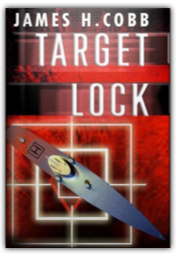

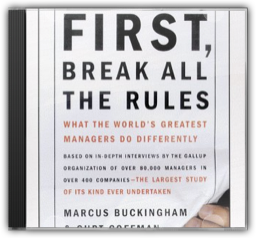
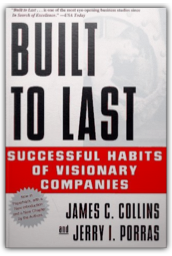
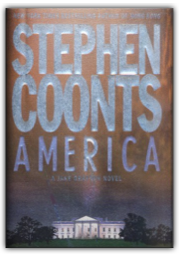
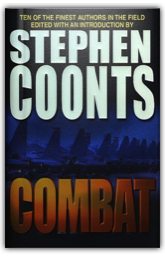
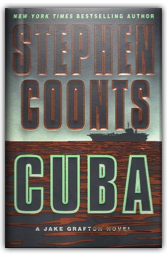
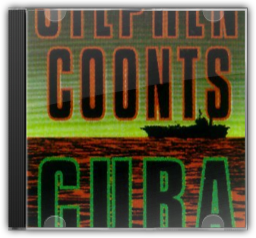

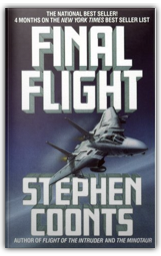
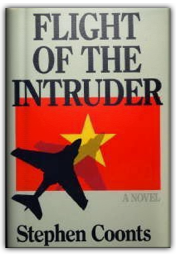

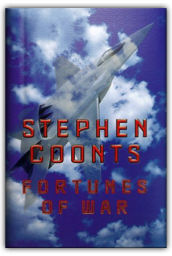
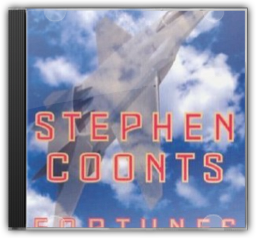


 Made with Delicious Library
Made with Delicious Library